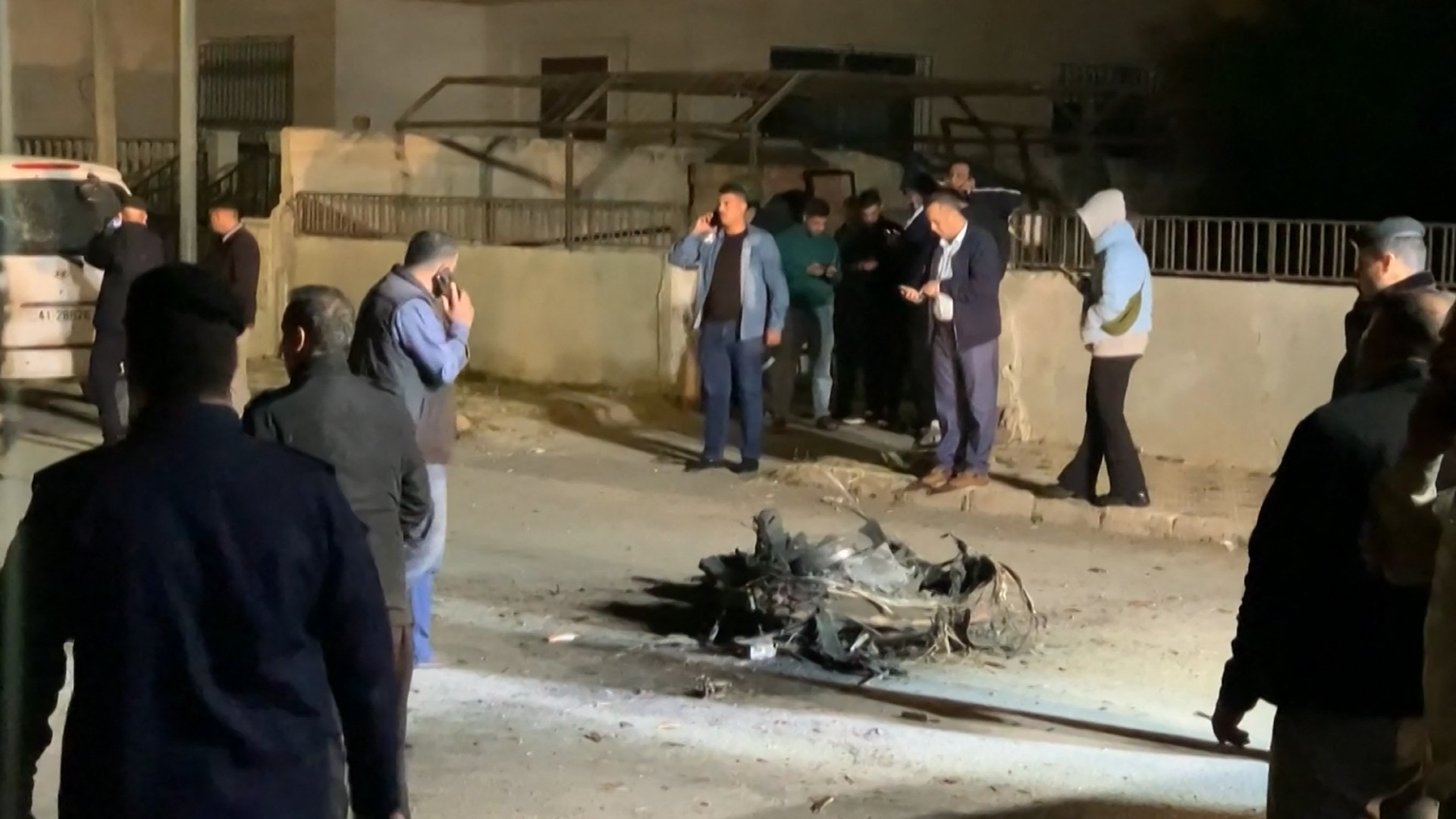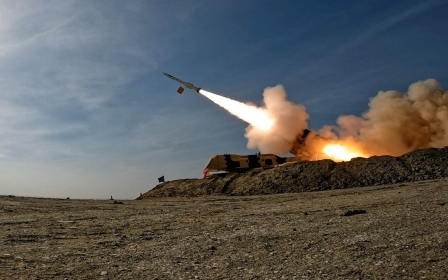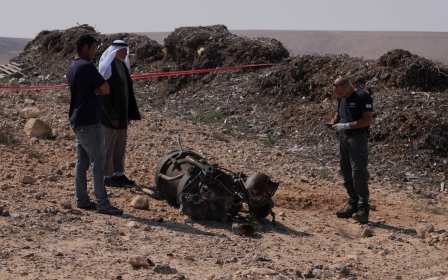Iran attacks: Jordan faces scrutiny over Israel military ties after downing missiles

Jordan's involvement in intercepting Iranian projectiles bound for Israel over the weekend has sparked questions about its security relationship with Israel, in a country with the highest population of Palestinian refugees.
Amman joined Israel, the US, UK and France in shooting down around 300 drones and missiles on Saturday night, in the first direct Iranian attack targeting Israeli territory.
The operation was in response to Israeli strikes on the Iranian consular building in Syria earlier this month that killed seven members of Iran's Islamic Revolutionary Guard Corps.
Jordan reportedly intercepted missiles near the Jordan Valley and along the border with Syria. It marked a rare occasion of an Arab country appearing to directly come to the defence of Israel.
Jordan was quick to state that it was defending itself, not Israel.
Stay informed with MEE's newsletters
Sign up to get the latest alerts, insights and analysis, starting with Turkey Unpacked
"Some flying objects that entered our airspace last night were dealt with and confronted to prevent them from endangering the safety of our citizens and residential and populated areas," Jordanian Foreign Minister Ayman Safadi said on Sunday.
The act garnered mixed reactions amongst commentators.
Israeli analyst Mairav Zonszein described it as “especially remarkable for [a] generation of Israelis who remembers sheltering from attacks from Jordan”. She said it showed “diplomatic deals are vital for stability”.
Meanwhile, Dima Khatib, the managing director of AJ+, criticised the interceptions, labelling them “a shocking scene”.
“Sister countries are responding, not to the attack of Israeli planes, drones and missiles on Palestine, but to an attack on Israel,” she said.
According to a report in the Wall Street Journal, Saudi Arabia and the UAE privately agreed to share intelligence with the US to thwart Iran's attack, while Jordan opened its airspace to Washington and its allies.
Michael A Horowitz, a security analyst at consultancy Le Beck International, said that the notion Jordan was protecting its sovereignty “cannot be dismissed”.
“Hundreds of drones and missiles overflew Jordan. No country would allow this to happen, no matter the target, particularly knowing that some Iranian missiles and drones can and have failed,” he told Middle East Eye.
Sean Yom, an expert on Jordanian politics and foreign policy, said the Hashemite kingdom’s defensive actions were “not an error, but a strategic necessity”.
“The Iranian missiles and drones were, technically, in violation of Jordanian sovereignty by entering its airspace,” he told MEE.
“Further, with the US leading much of the anti-air defensive strategy, and having considerable military forces in Jordan, it would have been impossible to stand idle.”
Yom said that the actions showed Jordan and Israel’s relationship were bound “in a triangular sense” by American guarantees of mutual security and foreign aid.
'Anger directed at Jordan'
Jordan has the largest number of Palestinian refugees of any country, with over 2.2 million officially registered by the United Nations.
The actual number of Palestinians in the country is believed to be considerably higher.
It established diplomatic relations with Israel in 1994 to engage on economic and security affairs, but the two country's dealings have mostly been kept out of the limelight.
'The Jordanian government cannot abrogate its peace agreement with Israel, or change the situation, because much of these geopolitical power dynamics flow firstly through Washington'
- Sean Yom, expert on Jordanian politics
One of the most public interactions between the two was a memorandum of understanding on water and energy agreed in 2022.
The deal would have seen Jordan build a solar plant with capacity to export 600 megawatts of energy to Israel, in return for Israel supplying Jordan with 200 million cubic metres of desalinated water.
But in November, weeks after the outbreak of war in Gaza, Jordan indicated that it would no longer go ahead with the plans.
Horowitz said that the kingdom’s intervention over the weekend did not necessarily show a deepening of ties with Israel.
“Of course in Israel, this is going to be spun this way, but the realities are that Jordan and Israel have butted heads very frequently,” he said.
Jordan has strongly condemned Israel’s war on Gaza, and backed South Africa’s case at the International Court of Justice accusing Israel of committing genocide in the enclave.
But many Jordanians want the kingdom to go further. For weeks, protesters gathered outside the Israeli embassy in Amman daily during Ramadan, demanding its closure and an end to normalisation.
Jordanian authorities have clamped down on such protests, detaining hundreds of activists since 7 October. Over 1,500 activists in Jordan have been prosecuted over the protests, according to lawyer Louay Obeidat.
While most have been released, dozens are still in administrative detention and around seven are thought to have been forcibly disappeared.
“The Jordanian interception carries with it significant domestic and international risks,” said Horowitz.
“We’ve seen a rise in anti-Israel protests in Jordan just before the Iranian attack. Positioning Jordan as a ‘defender of Israel’ certainly won’t please anti-Israel crowds inside Jordan, and there is always a risk that anger at Israel will eventually be directed at the monarchy.”
Yom said both the Jordanian government and its people have clearly demonstrated their “disgust” with Israel’s government and their “absolute horror with the humanitarian tragedy and crimes happening in Gaza at the hands of the Israeli military”.
“But the Jordanian government cannot abrogate its peace agreement with Israel, or change the situation, because much of these geopolitical power dynamics flow firstly through Washington, which dictates the rules of the game.”
Middle East Eye delivers independent and unrivalled coverage and analysis of the Middle East, North Africa and beyond. To learn more about republishing this content and the associated fees, please fill out this form. More about MEE can be found here.





